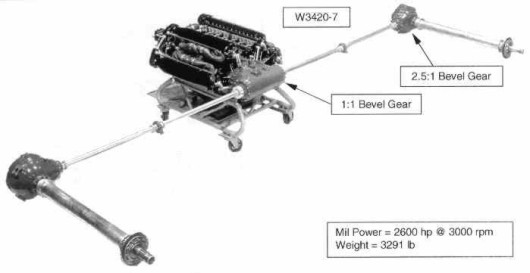Back in the 1940s you
couldn't accuse Allison engineers of not thinking
outside the box. The pictures below show two
versions of the W3420 designed for unconventional
arrangements of engines and propellers.
The W3420‑23 is the
engine used in the Fisher P‑75. As in the P‑39 and
the P‑63, the engine was mounted behind the pilot
with drive shafts running up to the gear box and
propeller in the nose of the aircraft. This
arrangement put the engine over the wing thus
reducing the weight of structure required to
support it, and put the pilot ahead of the wing
giving him better visibility both over the nose
and over the sides. There were 10 1 of these
engines built along with 19 others with different
dash numbers but with a similar configuration. In
1944 Fisher had a contract to build 2500 P‑75s,
but only 13 actually flew. The last one to fly is
now in the Air Force Museum in Dayton, Ohio.
The W3420‑7 was
another arrangement for keeping the engine over
the wing in the fuselage, but in this case it
would allow the propellers to be on the wings in
small, low drag, nacelles. This general
configuration was proposed with either tractor or
pusher propellers, and either propeller could run
left or right hand, whichever the customer
preferred. It was considered by Bell with pusher
props for a follow‑on to its XFM‑1. McDonnell
Aircraft's first aircraft proposal in 1939 was for
a long range fighter powered by either an Allison
W3420 or a P&W H3130 buried in the fuselage and
driving two pusher propellers aft of the wing
through extension shafts and angle gear drives.
Only one W3420‑7 was built, and it never flew.
The W3420 combined
two V1710s into one engine. Many parts were common
between the two engines, although some parts were
obviously different. Both of the engines shown
below had two crankshafts rotating in opposite
directions, although in some versions of the
engine they rotated in the same direction.


